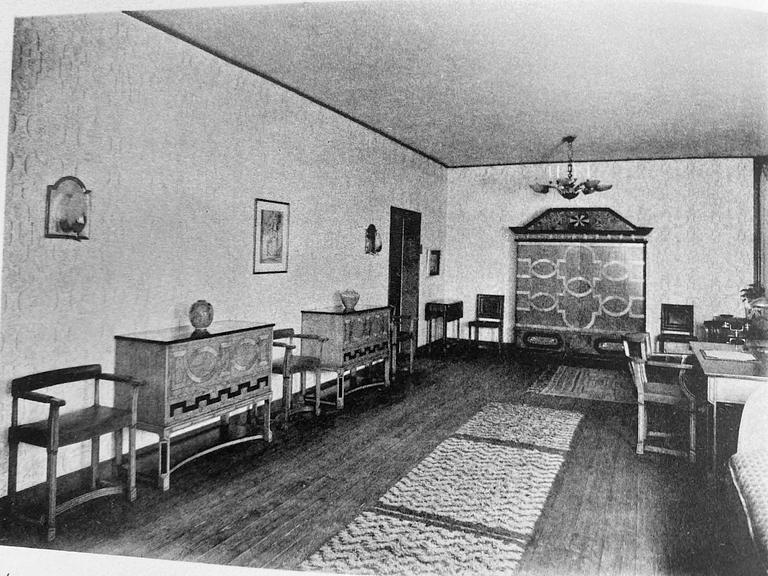Carl Bergsten
an oak veneered sideboard/ chest of drawers, Nordiska Kompaniet Sweden 1923. Part of a set exhibited in Gothenburg 1923.
Four drawers, stylized geometrical inlays in different kinds of wood. Maker's metal label NORDISKA KOMPANIET AB 15586-28127. 118 x 48 cm, height 89,5 cm.
This commode was part of a furnishing set of a total of fifteen pieces of furniture designed by Carl Bergsten for the Jubilee Exhibition in Gothenburg in 1923.
Architect and designer. Bergsten was important as one of those who shaped early 20th century Sweden. He was a curious and alert man who early on undertook study trips to the places that were most at the forefront during the first decades of the 20th century. The trip to Josef Hoffmann and his colleagues at the Wiener Werkstätte in Vienna was to become important.
In his hometown of Norrköping, Bergsten was commissioned to design the restaurant "Strömsholmen" for the Industrial Exhibition in 1906. The decor of this restaurant has become iconic with the black lacquered chairs that were truly in step with the most advanced counter-jugend of the time.
Carl Bergsten was the exhibition commissioner for what became extremely important for Sweden, the World Exhibition in Paris in 1925 and he was later given the honorable task of decorating M/S Kungsholm in 1928. A ship that came to include the best of the best in terms of Swedish works of art from the early 1920s.
Bergsten designed the auction's furniture for the Jubilee Exhibition in Gothenburg in 1923. The furniture shows signs of an incipient modernism.
The auction's sideboard with its geometric decor and blackened details is one of the most interesting in Bergsten's interior at the Gothenburg 1923 Exhibition.
Minor damages and wear.
Provenance
Arthur Glasser, head of a glass- and porcelain department at Nordiska Kompaniet.
Thence by descent.
Designer
Carl Bergsten was an architect and designer whose significance for the development of modern architecture and furniture design in Sweden during the early 20th century cannot be overstated. Several of his commissions, such as the Industrial Exhibition in Norrköping in 1906 featuring the now iconic Café Chairs, the Swedish pavilion at the 1925 World's Fair in Paris, the interior design for MS Kungsholm in 1928, and contributions to the Stockholm Exhibition in 1930, have been crucial for the evolution of Swedish architecture and design. Bergsten's often luxurious and costly furniture and interiors have become trendsetting and pivotal for establishing the concept of Swedish Grace.
Read more


















































































